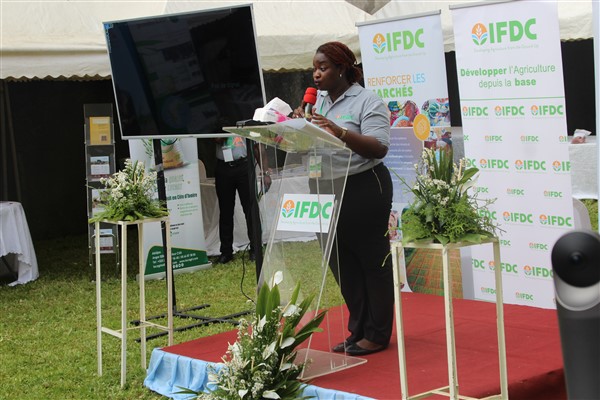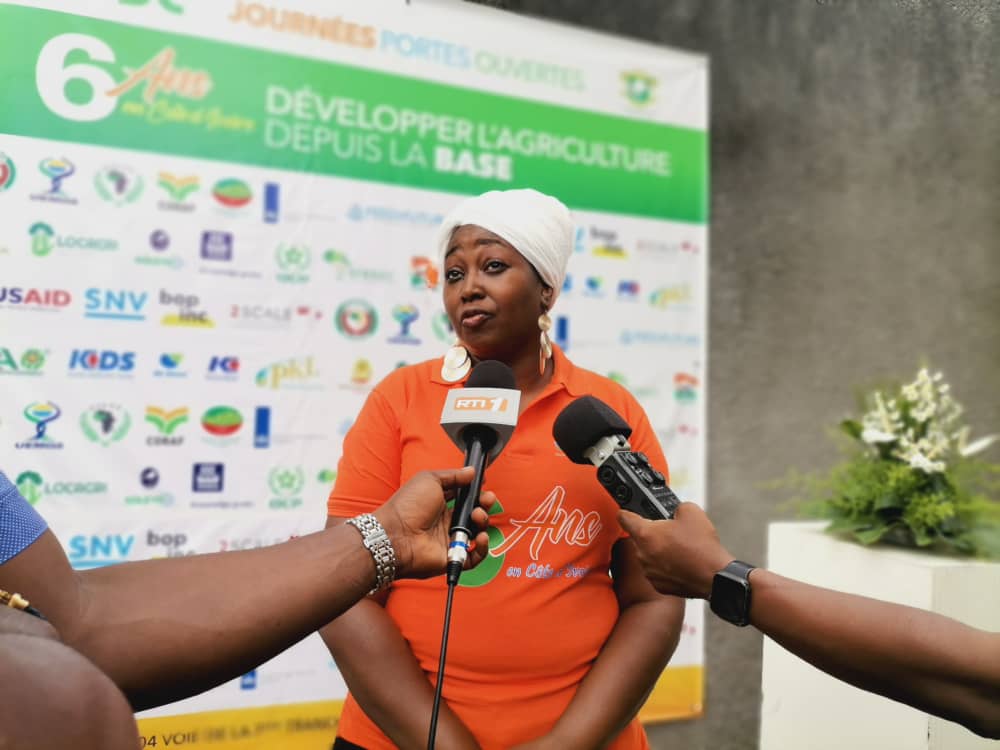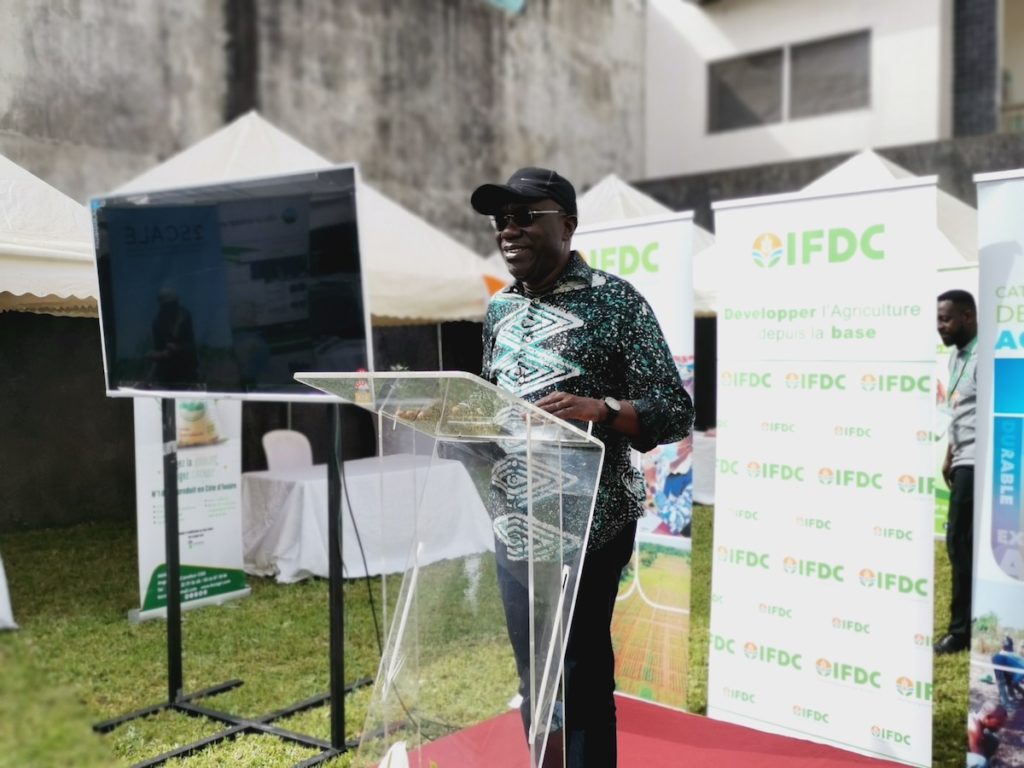
IFDC opened its doors in Côte d’Ivoire to the public May 18-19, 2022, to celebrate six years of activity in the country. The theme of the event was IFDC – Six years of Developing Agriculture from the Ground Up in Côte d’Ivoire.
With a presence in Côte d’Ivoire since 2016, IFDC supports the actors of the agricultural world: producers, researchers, technical services of the Ministry of Agriculture, and the private sector through various types of services for improving agricultural performance and promoting ecologically sustainable agriculture.
In her welcoming remarks, Olive M’Bahia, IFDC’s country representative of Côte d’Ivoire, said: “By holding these open days, IFDC wants to inform its public and private partners about its six years of existence in Côte d’Ivoire and on the various projects implemented, contributing to improve the agricultural production and productivity of the country.”
IFDC has been intervening in Côte d’Ivoire for a sustainable resolution of some key issues for the development of the agriculture sector. Activities have included soil fertility mapping, testing and promotion of fertilization formulas and technologies, development of agricultural input markets, and capacity building of public and private actors in the fertilizer sector. These actions have facilitated the availability, accessibility, and quality of fertilizers, which are key to improving agricultural productivity. IFDC’s interventions in Côte d’Ivoire are designed to be inclusive, with a particular focus on women and youth empowerment.
The overall objective of IFDC’s interventions is to stimulate higher quality agricultural production through the adoption of efficient agricultural technologies based on the rational and optimal use of water, land, seeds, and fertilizers.
IFDC also promotes resilient systems and climate-smart agricultural technologies among smallholder farmers to improve their income and food security.
IFDC focuses on building local capacity, working with smallholder farmers, promoting the participation and engagement of women and youth, and creating employment opportunities for youth in agribusiness partnerships. IFDC bases its strategy on forming public-private partnerships as drivers of change by developing innovative approaches to improve the governance and performance of agricultural value chains.
Dr. Oumou Camara, IFDC’s regional director of North and West Africa, after describing the intervention strategy of IFDC, said “Through these open days, we seek to share our achievements but also to understand yours and see how together we can accelerate agricultural transformation in Côte d’Ivoire. She then gave each guest the opportunity to speak. This great moment of sharing allowed everyone to express their expectations of partnership with IFDC and to testify on how IFDC interventions have positively changed their lives.
Representing the Minister of Agriculture, the director general of production and food security, Dr. Koffi Adjoumani, officially launched the IFDC Open Door Event in Côte d’Ivoire and declared: “We want to assure IFDC and its partners of the support of the Ministry of Agriculture and the government. We are aware of the importance of your interventions in the country, especially for our sustainable agricultural development.”
Even before the establishment of its office in Côte d’Ivoire, IFDC had implemented programs such as the Marketing Inputs Regionally (MIR) Plus project, funded by the Netherlands Directorate-General for International Cooperation (DGIS). This regional project contributed to improving the availability of technical information on agricultural inputs and facilitating access to them for agricultural producers in the country.
In 2009, through the AfricaFertilizer.org initiative, in collaboration with the FAO CountryStat program, IFDC began compiling data on the import, export, and consumption of fertilizers in Côte d’Ivoire for the first time. This activity of validation of statistical data on fertilizers is organized every year in collaboration with the Ivorian Ministry of Agriculture, Customs, and National Statistics and the private sector. The validation of this information allows the availability of reliable data, facilitating the decision-making of public authorities. At this time of crisis with soaring prices of fertilizers on the international market, this essential information helps to define clear solutions in response to this problem.

Since 2015, the Toward Sustainable Clusters in Agribusiness through Learning in Entrepreneurship (2SCALE) program, an incubator and accelerator of inclusive business clusters, has actively participated in strengthening agricultural value chains in Côte d’Ivoire by supporting actors to produce, process, and supply quality food products to local markets, while providing consumers, especially the most vulnerable, access to healthy and good quality products.
Through the West Africa Fertilizer Program (WAFP), and now the Enhancing Growth through Regional Agricultural Input Systems (EnGRAIS) in West Africa Project, IFDC has helped strengthen the private fertilizer sector and facilitated linkages between this sector and regional authorities and financial institutions to provide better access to fertilizer through increased movement of this input among member countries in the region. EnGRAIS has also enabled the establishment of an interactive decision-making platform that provides access to agricultural input packages consisting of adapted seeds, fertilizer recommendations, and good agricultural practices according to the agroecological zone. To date, more than 200 agro-input packages have been made available in our region, 60 of which are adapted to the agroecological zones of the country. Also through this project, IFDC provides technical support for the implementation of Economic Community of West African States (ECOWAS) regulations on fertilizer quality control and is collaborating with the Ministry of Agriculture and Sustainable Development on this issue to ensure the distribution of quality fertilizers in Côte d’Ivoire.
Desertification is a problem that concerns everyone, and this topic is at the forefront of the COP15 currently taking place in Côte d’Ivoire, gathering the international community until May 20. IFDC intends to continue to contribute to the fight against it in an effective way. Integrated soil fertility management, developed and promoted by IFDC, is a set of practices that include the rational use of organic and mineral fertilizers to maximize the efficient use of nutrients applied to the soil and improve agricultural productivity. This approach reduces the destructive use of land and thus the advance of the desert.

AFRIGEC, COP, SOLEVO, and YARA joined IFDC as partners in the events.
The open days bring together experts, professionals, and institutions sharing the same interests They are an opportunity for us to answer your questions about our activities and their impacts at the global, regional, and national levels and a chance for fruitful collaboration. These days are marked by the presentation of projects, innovations, and the skills of IFDC and the exhibition of products of IFDC partners.
For more information, contact Olive M’Bahia, IFDC Côte d’Ivoire country representative, ombahia@ifdc.org.
About IFDC: An independent non-profit organization, IFDC is active in more than 20 countries in Africa, Asia, and the Americas. By combining science-backed innovations, an enabling policy environment, holistic market system development, and strategic partnerships, the organization bridges the gap between identifying and scaling sustainable soil solutions, thereby improving household food security and enriching family livelihoods worldwide. Using an inclusive approach, IFDC employs local, environmentally friendly, and impact-driven solutions that effect change at the local, regional, and national levels.




